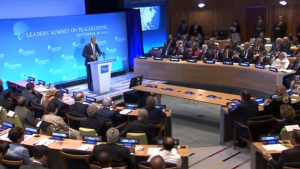
U.S. President Barack Obama announced on Monday (September 28) that more than 50 states had pledged some 30,000 new troops and police for possible deployment on United Nations peacekeeping missions.
“More than 50 countries, from Bangladesh to Colombia, from Finland to China, are making commitments totaling more than 30,000 new troops and police,” Obama told a summit of world leaders organized by the United States to boost support for U.N. peacekeeping.
China’s President Xi Jinping told the Peacekeeping Summit on the sidelines of the United Nations General Assembly that China would step up its backing of peacekeeping forces, a move that could make it one of the largest players in U.N. peacekeeping efforts.
“China will join the new UN peacekeeping capability readiness system and has thus decided to take the lead in setting up a permanent peacekeeping police squad and building a peacekeeping standby force of 8,000 troops,” Xi said.
Xi’s pledge comes as China is trying to show it is a responsible international player amid concern over its growing military might and territorial disputes in the Asia-Pacific region.
He also said China would provide $100 million in military assistance to the African Union in the next five years to support the establishment of an African standby force and to boost its capacity for crisis response.
The U.S. military told dozens of U.N. ambassadors and military advisors in New York in July that the U.N. needed rapid response forces, equipment and training.
The United States pays more than 28 percent of the $8.2 billion U.N. peacekeeping budget, but Beijing says that it contributes more personnel to peacekeeping missions than each of the other four permanent members of the U.N. Security Council: the United States, Russia, France and the United Kingdom.
China now provides around 3,000 of the more than 106,500 U.N. troops, police and advisers deployed by all countries, according to August data from the U.N. website, making it the ninth biggest contributor of peacekeeping personnel.
Its largest contingent is in South Sudan, where it is has played a growing diplomatic role and is a major investor in the oil industry. (Reuters)







